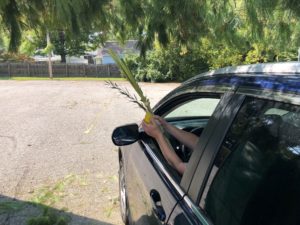
Worshippers can observe the commandments of Sukkot in KI’s Edith and Alex Berman Sukkah without ever leaving their cars. (Community photos by Lee Chottiner)
By Lee Chottiner
Community Editor
First, you turn into the Keneseth Israel driveway from Taylorsville Road, motoring slowly past the synagogue into the parking lot.
Then you see it, erected on the far end of the pavement, looking a little like a rustic drive-through bank.
Actually, it’s an innovative way to observe a commandment of Sukkot, that of dwelling in booths, during the coronavirus pandemic.
It’s a drive-through sukkah, enabling people to shake their lulavs, sniff their etrogs and eat a little something underneath the holy tabernacle – all without ever leaving their cars.
Assembled by the Men’s Club, the Edith and Alex Berman Sukkah, named for the benefactors of KI’s first sukkah after moving to the Upper Highlands, is a modification of KI’s prefabricated booth. It is wide enough to accommodate most vehicles (orange cones are set up to guide motorists underneath the roof), with a six-foot clearance from thatch (skach in Hebrew) to asphalt.
That means most vehicles can use it, said Cantor Sharon Hordes. “[But] don’t come in your Hummer or truck with the big tires.”
KI Executive Director Yonatan Yussman said the idea for the drive-through sukkah was discovered while he and other members were searching online for ways to observe the festival safely.
“There are various listservs and Facebook groups that are dedicated to thinking up ideas for services during COVID,” he said. “The ideas were tossed around on those groups.”
When he pitched this idea to Hordes, “it was like, ‘Wow! How do we do this,’” she recalled.
The 10-by-30-foot sukkah, which took a couple afternoons to assemble, complies with Halachah – Jewish law – as it relates to putting one up. It has three walls, each of which is at least 28 inches long and more than 40 inches high. The walls are suspended no more than nine inches from the ground and the roof is made with organic material enabling its users to see the sky or stars – through their sunroofs.
“We’re just trying to keep to the letter, and also the spirit, of the law by enabling people to do what they need to do,” Hordes said.
Motorists are expected to remain in their vehicles while they are under the sukkah, and they should bring their own lulav-etrog set if they choose to observe that commandment.
“Due to COVID, we do not provide a shared lulav and etrog,” Yussman said, “although we did offer all of our members a free lulav and etrog if they wanted one this year.”
For those members who want to use the sukkah, KI set up an online registration through SignUpGenius to avoid lines and comply with social distancing. As of Monday, roughly 25 families had reserved times.
In addition, Hordes led virtual Sukkot services from the booth using Zoom.
The Berman and Kohn families donated KI’s new sukkah last year, the one being used using as the drive-through “in loving memory” of Edith and Alex, according to the sign on the side of the booth.
Novel as the idea is, Yussman expects the drive-through sukkah to be just a one-time time thing, not a new tradition.
“Next year, hopefully we will use our sukkah for in-person events with people under it,” he said, “not just cars.”



